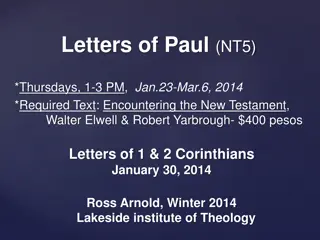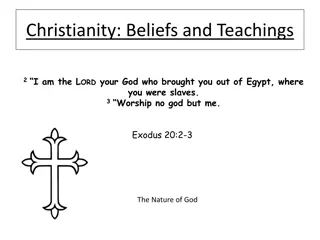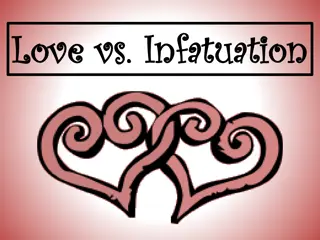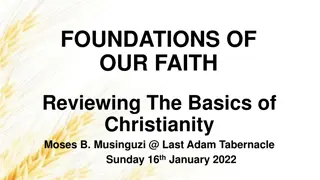Understanding the Definition of Love in 1 Corinthians 13:4-8
Exploring the Greek roots and biblical context of love as described in 1 Corinthians 13:4-8. Delve into the distinctions between different types of love, such as agape and philos, and the enduring qualities of love outlined in the passage.
Download Presentation

Please find below an Image/Link to download the presentation.
The content on the website is provided AS IS for your information and personal use only. It may not be sold, licensed, or shared on other websites without obtaining consent from the author. Download presentation by click this link. If you encounter any issues during the download, it is possible that the publisher has removed the file from their server.
E N D
Presentation Transcript
Defined 1 Corinthians 13:4-8 4. Love Greek agap ( ) Affection, good-will, love, benevolence (Thayer, 4) Love, generosity, kindly concern, devotedness (Moulton, 2) Love (Tyndale: 1535; Great Bible: 1540; Geneva: 1562) Charity (Bishop s Bible: 1602:King James: 1611)
Defined 1 Corinthians 13:4-8 4. Love Distinction between this word and philos ( ) Thayer says agapa (verb) properly denotes a love founded in admiration, veneration, esteem while phile denotes an inclination prompted by sense and emotion (653) Kittel s writes phile is never used for love of God, and neither it nor agapa ever denotes erotic love (Kittel Abridged, 1263-1264)
Defined 1 Corinthians 13:4-8 4. Love This is a love of choice It considers the well-being of others It is not based on fleeting emotion It recognizes the value of its object 1 John 4:19-21
Defined 1 Corinthians 13:4-8 Suffers long Greek makrothumei ( ) Compound long and word for suffering or passion Patient 3x in James 5:7-8 Holds firmly through great difficulty
Defined 1 Corinthians 13:4-8 Suffers long Even though it may face disappointment or dissatisfaction it continues through such hardships. Romans 2:4 a quality God
Defined 1 Corinthians 13:4-8 And is kind Greek chr steuetai ( ) To show one s self mild, to be kind, use kindness (Thayer, 671) In Scripture it is used only here. Not saying that love never demands a stern hand, but even in sternness a disposition that is considerate. Tyndale corteous (i.e. courteous). Titus 3:4-7 (noun form)
Defined 1 Corinthians 13:4-8 Love does not envy Greek zeloi ( ) In a good sense, generous rivalry; noble aspiration; in NT, zeal, ardour in behalf of, ardent affection ...In a bad sense, jealousy, envy, malice...indignation, wrath (Moulton, 181) KJV zeal (6x), indignation (2x), envy (6x), fervent mind (1x), jealousy (1x) and emulations (1x)
Defined 1 Corinthians 13:4-8 Love does not envy There are times godly love should be zealous Paul For I am jealous for you with godly jealousy. For I have betrothed you to one husband, that I may present you as a chaste virgin to Christ (2 Corinthians 11:2). Sometimes love may stir zeal but not envy.
Defined 1 Corinthians 13:4-8 Love does not parade itself, is not puffed up Greek parade itself perpereuetai ( ) To boast one s self [A.V. vaunt one s self ] (Thayer, p. 507). NASB Love does not brag NIV It does not boast
Defined 1 Corinthians 13:4-8 Love does not parade itself, is not puffed up Greek puffed up phusioutai ( ) To inflate, puff up; metaphorically to inflate with pride and vanity; Passively to be inflated with pride, to be proud, vain, arrogant (Moulton, 431) ...Put on airs (BAGD, 869).
Defined 1 Corinthians 13:4-8 Love does not parade itself, is not puffed up Tyndale and the Great Bible put this swelleth not. NASB Is not arrogant . Vincent tells us that the distinction between these two characteristics is that the first word denotes outward display while the second describes a person s inward disposition (3.264).
Defined 1 Corinthians 13:4-8 5. Does not behave rudely Greek rudely asch monei ( ) To behave in an unbecoming manner, or indecorously; to behave in a manner open to censure (Moulton, 58). KJV and ASV Doth not behave itself unseemly. Septuagint in five passages. One defines proper and improper corporal punishment of a criminal (Deut. 25:3). Four refer to nakedness (Ezek. 16:7, 22, 39; 23:29).
Defined 1 Corinthians 13:4-8 5. Does not behave rudely The root schema Fashion, form; fashion, external show; guise, appearance (Moulton, 394). Behavior that is not good form or that does not maintain a good appearance. Behavior embarrassing to another person is not loving, nor is behavior that causes someone to be humiliated in the presence of others.
Defined 1 Corinthians 13:4-8 Does not seek its own Greek it s own is ta heaut s ( ) lit. the things of herself (or itself). In the Greek agap is a feminine noun as is brought out in the KJV, which puts this, seeketh not her own. Irony when love is demonstrated unselfishly it actually blesses the one who gives it the most!
Defined 1 Corinthians 13:4-8 Does not seek its own The selfish soul rarely finds satisfaction in the love shown toward him or her. When love does not seek it s own things (LO, YLT) it actually finds them! Luke 6:38
Defined 1 Corinthians 13:4-8 Is not provoked Greek paroxunetai ( ) Passively, to scorn, despise; to provoke, make angry, to exasperate; to burn with anger (Thayer, 490). Only twice in the New Testament: here and in Acts 17:16 Here (much like envy in verse 4) we see there are times when love is not provoked and times when it must be. KJV Is not easily provoked (cf. Titus 1:7)
Defined 1 Corinthians 13:4-8 Thinks no evil Greek thinks logizetai ( ) 1. To reckon, count, compute, calculate, countover; ... 2. To reckon inwardly, count up or weigh the reasons, to deliberate,... 3. By reckoning up all the reasons to gather or infer; ... (Thayer, 379). Tyndale, Great Bible, Geneva Bible, Bishop s Bible, and King James Version Thinketh no evil
Defined 1 Corinthians 13:4-8 Thinks no evil American Standard Taketh not account of evil ; NASB Does not take into account a wrong suffered ; NIV It keeps no record of wrongs To love someone means that we are willing to set aside wrongs others may have done to us in the past, rather than keeping a tally of past disappointments.
Defined 1 Corinthians 13:4-8 6. Does not rejoice in iniquity, but rejoices in the truth Godly love does not greet, derive joy from, or welcome that which is wrong, but rather it rejoices with that which is true. Truth that which is true and honest but also revealed, Divine truth.
Defined 1 Corinthians 13:4-8 6. Does not rejoice in iniquity, but rejoices in the truth Love delights in the way of truth revealed by a loving Creator. Greek iniquity adikia ( ) Wrongdoing ...misdeeds...unrightoeusness, wickedness, injustice (BAGD, 17).
Defined 1 Corinthians 13:4-8 6. Does not rejoice in iniquity, but rejoices in the truth Acts that violate revealed truth, and acts that fail to follow truth (cf. James 4:17). Godly love must reject such things that do not comply with God s will and delight in all things that conform to the truth of God s word.
Defined 1 Corinthians 13:4-8 7. Bears all things Greek bears stegei ( ) To cover; 1. to protect or keep by covering , to preserve: 2. to cover over with silence; to keep secret; to hide conceal... 3. by covering to keep off something which threatens, to bear up against, hold out against, and so to endure, bear, forbear (Thayer, 586).
Defined 1 Corinthians 13:4-8 7. Bears all things Thayer notes that this phrase in 13:7 Is explained by some, love covereth [so R.V. (that is ASV) in the margin], that is hides and excuses, the errors and faults of others; but it is more appropriately rendered (with other interpreters) beareth (ibid.). Galatians 6:2
Defined 1 Corinthians 13:4-8 Believes all things, hopes all things Not gullibility, hoping for and expecting the best. Not believing all things as truth It will try to assume that someone else has proper motives (cf. thinks no evil ). Contrasting attitude if we do not assume the worst.
Defined 1 Corinthians 13:4-8 Endures all things What is the difference between being longsuffering (v. 4) and endurance in this verse? Findlay tells us that hupomenei ( ) rendered endures in verse 7 signifies patience in respect of adverse and afflictive circumstances whereas longsuffering in verse 4 involves being Patient towards injurious or provoking persons (2.899).
Defined 1 Corinthians 13:4-8 8. Love never fails Turns focus back to the broader subject of miraculous spiritual gifts (12-14). One final quality to help us define love it never ends (ESV).
Defined 1 Corinthians 13:4-8 8. Love never fails A love grounded upon the principles described in these verses will endure. God s love in the gospel of Jesus Christ will never come to an end.

















































